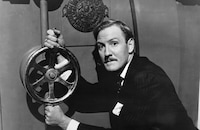Father Came Too
Cast & Crew
Peter Graham Scott
James Robertson-justice
Leslie Phillips
Stanley Baxter
Sally Smith
Ronnie Barker
Film Details

Synopsis
Returning from their honeymoon, newlyweds Dexter and Juliet Munro set up residence in the luxurious home of actor-manager Sir Beverly Grant, the irascible father of the bride. The couple is hopeful of obtaining their own home, and the gullible Dexter is conned by Roddy Chipfield, a real estate agent and amateur actor, into overbidding at auction for a ramshackle cottage in the country. Moving into their "desirable property," the couple is met by termites, cows in the garden, inept workmen, and the intruding Sir Beverly. Disheartened by the realization that the house needs a complete overhauling, Dexter shows Sir Beverly to the door, followed closely by the furious Juliet. Left alone in the cottage, Dexter accidentally starts a fire while trying to prepare a meal. The local fire brigade arrives too late, and the house is destroyed. Roddy Chipfield tells the distraught husband of plans to build a road through his property, thus permitting the couple to recoup their initial losses and build a new "dream house" nearby.

Director
Peter Graham Scott
Cast

James Robertson-justice

Leslie Phillips
Stanley Baxter
Sally Smith
Ronnie Barker
Timothy Bateson
Philip Locke
Kenneth Cope
Eric Barker
James Villiers

Raymond Huntley

Geoffrey Dunn
Anita Sharp Bolster
Julian Orchard
Cardew Robinson
Barbara Roscoe
Sydney Bromley
Clifford Earl
Nicky Henson
Arthur Mullard
Fred Emney
Peter Jones
Terry Scott
Hugh Lloyd
Joseph Brady
Vanda Hudson
John Bluthal
Patrick Newell
Crew
Arthur Alcott
Henry Blyth
Jack Davies
Geoffrey Haine
Frank Hollands
Simon Kaye
Norrie Paramor
Leslie Parkyn
Harry Pottle
Tom Priestley
Lionel Selwyn
Julian Wintle
Reg Wyer

Film Details

Articles
Ronnie Barker (1929-2005)
He was born Ronald William George Barker in Bedford, England on September 25, 1929 and raised in Oxford. Educated at the City of Oxford High School, he took a job as a clerk at Westminster Bank, all the while harboring dreams of becoming an actor.
He was offered his first break in 1948 when he joined the Manchester Repertory Company. His roles were small, but for a starry-eyed 19-year-old it could not have been more fascinating. Three years later, he joined the Oxford Playhouse where he gained more experience, particularly in comedy, and in 1955, director Peter Hall gave him his first big opportunity at the famed Arts Theatre in London, where he worked steadily and developed his craft over the next several years.
After some success on BBC radio, Barker moved into films. His parts were small, but his comic timing and avuncular mannerism made him memorable in some sharp comedies: the little known Terry Thomas gem Kill or Cure (1962); a put-upon customer at a railway station in Doctor in Distress (1963); his first prominent film role as doleful sad sack in The Bargee (1964); and a cameo in the pleasant if harmless family outing Runaway Railway (1965).
Yet his achievements in film paled in comparison to his success on television, which would prove to be Barker's calling card. In 1966, commentator David Frost would hire him (along with Ronnie Corbett and John Cleese) for The Frost Report, a wildly popular revue show that would satirize the popular fads and political situations of the day. From there, he moved onto Frost on Sunday the following year which was also hit. Not coincidentally, his good fortune on television led to improved film parts: a dramatic turn in a spy thriller starring veteran character actor Van Heflin The Man Outside (1967); and as a ghost who tries to help young children save a historical landmark in Ghost of a Chance (1968).
Still, his success up to this point was marginal when compared to the golden stride he hit in the '70s. He starred in no less than three hit series that decade: the popular sketch comedy opposite Ronnie Corbett in The Two Ronnies (1971-1987); the endearing prison sitcom Porridge (1973-1977); and as a frugal Northern shopkeeper with a penchant for stammering in Open All Hours (1973-1985). All three of these programs had developed a huge cult following in America over the years due to their screening on public television, and it's safe to say that Barker was, if not an international star, a very welcome talent and presence to million of fans worldwide.
This decade would also contain his most lauded film performance - that of Friar Tuck in Richard Lester's Robin and Marian (1976), co-starring Sean Connery and Audrey Hepburn. Barker offered a cheeky take on this established character with just the right touch of pathos, making him an essential component to this robust adventure film. Oddly, despite his good critical notices, he made only one more film that decade, a full theatrical feature based on his television series, Porridge (1979).
Barker was still a popular fixture in British entertainment when he semi-retired in 1987. He spent most of his time operating an antique shop in the Oxfordshire village of Chipping Norton, but he was always coaxed back for an occasional appearance, the most impressive by far were his two serio-comic turns in The Gathering Storm (2002), playing the wise manservant to Albert Finney's Winston Churchill; and the HBO special My House in Umbria (2003), a moving portrayal as a retired general maintaining his wit and dignity after tragic circumstances opposite Dame Maggie Smith. Barker is survived by his wife of 48 years, Joy; a daughter, Charlotte; and sons, Adam and Larry.
by Michael T. Toole

Ronnie Barker (1929-2005)
Quotes
Trivia
Notes
Working titles: And Father Came Too and We Want To Live Alone. Opened in London in February 1964.














